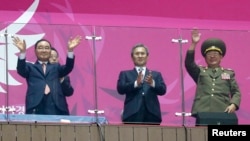The visit to South Korea of the highest-level North Korean delegation in five years is generating hope for a thaw in the frosty relationship that has blanketed the divided peninsula for decades. South Korea’s president is among those expressing such a desire.
South Korean President Park Geun-hye is calling for regular talks between Seoul and Pyongyang. The comment to her senior aides Monday follows a sudden and rare visit to the South by top North Korean officials.
President Park said efforts should be made “to ensure that the upcoming high-level talks will pave a way for peaceful unification by holding regular inter-Korean dialog, not just a one-time dialog.”
The president’s remarks follow Saturday’s half-day discussion between officials of the South and North, held in the port city of Incheon.
The eleven-member North Korean delegation was led by the vice chairman of the powerful National Defense Commission. Vice Marshal Hwang Pyong-so is considered by analysts to have recently become the second-most powerful figure in North Korea, behind leader Kim Jong Un.
South Korean officials have acknowledged they were caught by surprise when the North Koreans contacted them Friday about meeting in the South on Saturday - the same day as the closing ceremony of the Asian Games.
Both Koreas had separate delegations participating in the athletic event.
The senior rank of those who flew to Incheon was interpreted as a signal the North Koreans wanted to achieve more than merely attending a sports ceremony. The Saturday talks appear to have cleared a path towards a possible summit.
In Seoul, Unification Ministry spokesman Lim Byeong-cheol said authorities have not yet agreed on an agenda for reviving high-level talks late this month or early November.
Lim told reporters the issue of families divided on the peninsula is the most important one to be resolved and the South believes it is necessary to raise that matter.
The last high-level talks with the North occurred in February.
The resumption of direct contacts between Seoul and Pyongyang comes at a time of considerable speculation about the wellbeing of the North’s leader.
Kim, in his early 30’s, has not appeared in public for more than a month, his longest period out of sight since succeeding his father, who died in 2011.
In the most recent video news clips released by state media he is seen limping. He also has gained considerable weight since taking over what is considered the world’s only hereditary communist dynasty.
Some analysts and sources in the intelligence community believe Kim may be out of the spotlight to recover from some type of leg surgery.
Officials in Seoul say a member of the North’s visiting delegation Saturday assured them Kim has no health-related issues.
Lim Jae-chun, a professor of North Korean studies at Korea University in Seoul, thinks Kim is firmly in control.
“Kim Jong Un’s power is stable, although he’s sick. North Korea might want to send a message to the outside world: Kim Jong Un is in control and he was the man who sent the power elites as his delegates,” said Lim.
The professor added, however, the early optimism that this will lead to a major breakthrough should be tempered.
“There should be give-and-take to make an agreement between the two Koreas. It’s too early to predict what and how much each side can give to each partner at this moment. So we need to wait and see,” said Lim.
The two Koreas technically remain at war. An armistice was signed in 1953, halting hostilities after nearly three years of combat that also involved U.S.-led U.N. forces fighting the Chinese. South Korea was not a signatory to the armistice.
Relations have remained chilled through the decades with sporadic acts of violence, especially along the border.
VOA Seoul Bureau Producer Youmi Kim contributed to this report.





